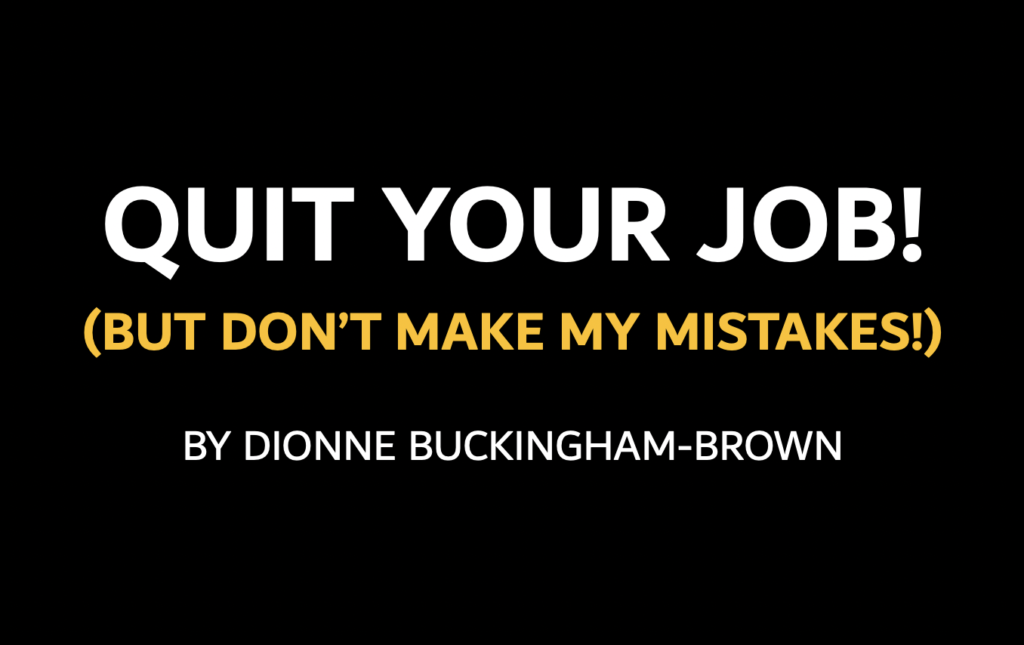
By Dionne Buckingham-Brown {grow} Contributing Columnist
For millions of people now working from a desk at home – rather than a desk in an office – the COVID pandemic has forced them to ask one glaringly obvious question: Is it time to quit your job?
A few years ago, the same thought went through my head, and in dramatic fashion, I quit my job. What followed was … a mess.
So I’m here today to help you learn from my mistakes.
The evidence is that more and more people are looking at this option. Between 2018 and the beginning of 2020, approximately 27 million Americans quit their full-time jobs to work for themselves.
It brought the total number of self-employed people to 42 million (compared with approximately 126 million traditional full-time workers).
Although the official post-COVID figures are not yet in, expect the trend to not only continue, but accelerate – rapidly.
My shift to self-employment
I made the shift to self-employment five years ago.
I’d served as a police officer in the UK for 22 years and finally decided I’d had enough. After years of stress and ridiculously long hours, I quit.
I packed my belongings, and in a very Bridget Jones way, told my boss, “Thanks for the memories, but I’m done!”
And that was it. I walked out without a Plan A, let alone a Plan B.
A friend recently asked me: “When you quit your job, what would you have done differently if you knew then what you know now?”
It got me thinking. What would I do differently if I was one of the millions of people working from home and thinking about switching to working for myself?
For anyone who’s thinking of making the leap to self-employment, I want to share four lessons I’ve learned along the way.
1. Don’t just quit your job, prepare!
I quit without a plan. That was not the best idea.
Working from home is your chance to plan, research, strategize, and prepare for the shift to self-employment in advance.
First, take a long hard look at what skills you do (and don’t) have that you could feasibly charge money for. Then, get absolutely clear on what type of day-to-day work activities energize and inspire you.
Many people can tolerate a job they’re not passionate about in exchange for stability and security.
When you work for yourself, that’s not a viable option in the short-run.
There are so many uncertainties and challenges when you’re self-employed. You better be clear that you’re doing something that you love or you — and the people around you — will be miserable.
2. Work on that personal brand NOW
It wasn’t until 2017 when I read Mark Schaefer’s book KNOWN that I truly understood the power of standing out and building a personal brand.
As he explained, it’s not who you know that truly counts in business anymore … it’s who knows you that matters.
I already understood the power of using LinkedIn for networking and business, but after reading Mark’s book, it became a commitment.
When I first started using LinkedIn, I used it to look for potential clients. Now, I use it to let my potential clients find me. It’s a subtle but important difference … and it works.
Being known in your industry, marketplace, or sector is vital to your success.
But when I quit my job, I didn’t know that.
And I didn’t understand how much the people you know can influence your chances of successful self-employment either.
In fact, I had a HUGE challenge. For the eight years leading up to quitting my job, I’d spent considerable time and effort working on NOT being known — I worked in covert intelligence!
If I had to do it all over again, I would have acted on the advice from Mark’s book and developed a personal brand long before I quit.
3. Learn everything you can about sales and marketing
No matter what you do, if you work for yourself, you’re in sales and marketing.
This is absolutely fundamental to your success, or failure, in self-employment. No customers equals no business.
I know plenty of self-employed people (speaking from experience!) who are brilliant at the technical aspect of their business, they’re failing at effectively selling or marketing themselves.
It’s amazing how many problems in business go away when your sales and marketing are running smoothly!
Marketing cannot be an afterthought. It has to be baked into the very fabric of your startup from the beginning.
4. Accept your self-worth
As a self-employed businessperson, you don’t earn what other people think you’re worth. In the long-term, you earn what you think you’re worth.
If you don’t value your services or advice, no one else will.
I cannot stress this point enough.
Like many people, I’ve struggled with imposter syndrome and low self-worth at times.
But I’ve also learned that, as Dr Ivan Joseph explained in his fantastic TED Talk, confidence is a skill you can practice and develop over time.
The more you believe in yourself, the more other people will too.
Quit your job. Seize the day!
The best time to start planning to be self-employed is now. It’s the ultimate in self-reliance and the ultimate freedom. You do what you want, when you want, for who you want.
If you can make it without an employer, without loans, without business partners, without funding and with nothing but your self-employed skills, hustle, and determination, you can make it anywhere.
If you’ve been working from home for the past few months, maybe, just maybe, now is the time to make the switch.
 Dionne Buckingham-Brown is a UK-based consultant specializing in planning and execution in marketing, lead generation, and selling strategies for business growth. She’s also created a pathway to help working mothers transition to self-employment. Visit her website and follow her on Twitter.
Dionne Buckingham-Brown is a UK-based consultant specializing in planning and execution in marketing, lead generation, and selling strategies for business growth. She’s also created a pathway to help working mothers transition to self-employment. Visit her website and follow her on Twitter.


